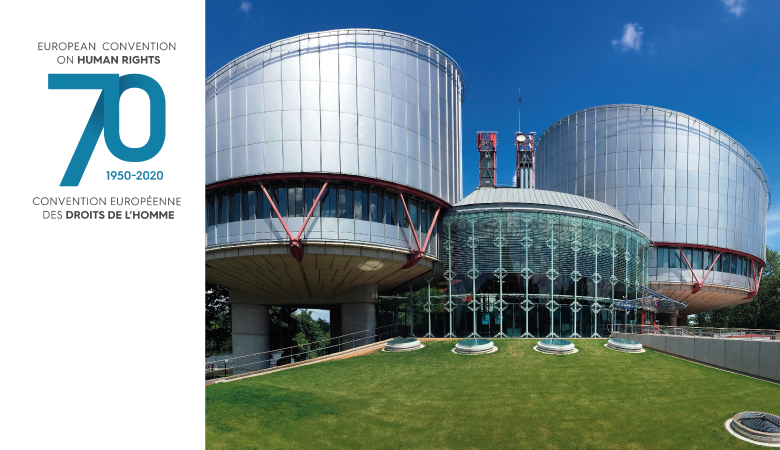70th Anniversary of European Convention on Human Rights

70th Anniversary of European Convention on Human Rights
On Friday 27 November 2020, an online international conference was held to celebrate the 70th anniversary of the Convention for the Protection of Human Rights and Fundamental Freedoms. The day-long programme offered contributions presented by Czech and foreign experts on various aspects of the system of the Convention. Topics included history, theoretical aspects, national approaches to the Convention, the relationship between the Convention and migration law, as well as reform of the system of the Convention, and the European Court of Human Rights and the Convention in the context of the Covid crisis.
The conference was co-organised by the Human Rights Research Centre (VCLP-UNCE), the Department of Public International Law of the Faculty of Law of Charles University, and the Czech Society of International Law. The aim of the conference was to promote and celebrate the success achieved by this system, and discuss the various issues and perspectives related to its current and future development. The conference was divided into seven thematic sessions, which featured presentations by nearly 30 speakers from different countries.
Professor Pavel Šturma, head of the Department of Public International Law and UNCE coordinator gave the welcome address to open the conference. The morning programme started with a session dedicated to the history of the Convention and related theoretical questions. Manfred Nowak spoke about the development of the European Court of Human Rights (“ECHR”) and the Convention, comparing them to other regional systems of human rights protection. His speech was followed by Genevieve Woods’s contribution on the influence of the Convention on the development of the Library of the Court and on the role of the Library in spreading information about the Convention. In the last contribution of this session, Professor Šturma discussed questions of state responsibility, addressing, for example, the issue of whether the application of the Convention by the ECHR reflects the principles of state responsibility or whether the Convention, and the decisions of the ECHR in particular, have contributed to the development of state responsibility in international law.
The second session, chaired by Associate Professor Veronika Bílková, focused on national approaches to the Convention. In his presentation, Jan Kratochvíl talked about subsidiarity as the instrument shaping the relationship between the Strasbourg Court and national courts, and about aspects of subsidiarity in the case-law of the ECHR. Pavel Ondřejek and Alla Tymofeyeva addressed the question of whether the Czech railway operator České dráhy may lodge an application with the ECHR, and the position of state enterprises before the ECHR in comparison to their position before the Constitutional Court of the CR. A part of the session was also dedicated to the current topic of modern technologies, in particular Ganna Yudkivska's speech on the evolving concept of privacy in the era of transparency and widespread surveillance on the internet.
The third session, focusing on the Convention and migration law and chaired by Věra Honusková, began with a presentation looking into the dialogue on asylum between the ECHR and Hungary. Boldizsár Nagy analysed the ECHR's decision-making process in Ilias and Ahmed v. Hungary. Josef Mrázek then discussed the human rights of migrants and their relationship with the Convention, focusing on the protection of migrants in the case-law of the Strasbourg Court and the position of migrants’ human rights in international law in general. At the end of the session, Drahoslav Štěpánek emphasised that even though the Convention does not expressly provide for the right to asylum, and refugee law has always been considered separately from human rights, the ECHR’s case-law recognises the legal relevance of the Articles of the Convention for asylum law.
The afternoon programme began with a debate on reforming the Convention, and on the current crisis caused by the Covid-19 pandemic. In his opening presentation, Michal Kučera introduced the process of issuing advisory opinions under Protocol No. 16 to the Convention, from the perspective of the history, objective, purpose, and mechanism of this process. The discussion then moved on to the topic of restricting the rights and freedoms enshrined in the Convention, addressed by Emil Ruffer. He analysed the ECHR's case-law on the application of Article 15 of the Convention and examined whether the measures adopted due to Covid-19 did in fact require derogations from the obligations under the Convention. The third speech presented by Ľubomír Majerčík and Martina Grochová also dealt with the current situation, focusing on certain measures taken by the ECHR during the Covid crisis and emphasising their possibly problematic aspects. The Covid session was concluded with a presentation on the legalisation of mass surveillance as a means to fight the Covid-19 pandemic. Instead of analysing the current situation, Lusine Vardanyan looked to the future by examining the question of whether the ECHR’s case-law could potentially prevent mass surveillance in the post-Covid era.
Unlike the previous sessions of the conference, the fifth one did not feature speeches related to one overarching topic. The audience was first addressed by Ivana Jelić, who spoke about the rights of minorities under the Convention, offering an overview of the protection of the rights of minorities by providing information on its history and presenting relevant case-law produced by the ECHR. The ECHR's case-law was discussed also in the two contributions that followed. In the first one, Jennie Edlund talked about the problematic aspects of the best interests of the child in migration cases before the ECHR, their possible causes, and consequences for the Contracting Parties. In the second presentation, Hovsep Kocharyan analysed the ECHR’s decisions to search for the boundary and balance between the freedom of expression and the right to be forgotten.
The speakers in the following session, which looked into the relationship between the world of business and the Convention, showed the audience that human rights are not only about individuals and states. In the opening speech, Olena Uvarová tried to answer the question as to whether the imposition of a duty on business corporations to carry out in-depth screening of their activities with respect to human rights should be made part of the state’s obligation to protect human rights against violations by third parties. Harald C. Scheu and Jitka Brodská then introduced the concept of corporate responsibility for human rights violations in the relevant case-law of the ECHR. They focused on the horizontal effect of human rights, and the extraterritorial application of the Convention.
The late afternoon session examined the interaction between the European Court of Human Rights and other bodies and organisations. Petr Válek’s contribution focused on the relationship and cooperation between the ECHR and the Committee of Legal Advisers on Public International Law (CAHDI). Natálie Illková picked up on this topic by discussing the relationship between the ECHR and the European Commission for Democracy through Law (Venice Commission). As for interaction with other decision-making bodies, Ivana Machonová Schellongová spoke about the differences in the decision-making processes of the ECHR and the UN Human Rights Committee, and Nikola Klímová Kurková examined the issue of concurrent proceedings before the ECHR and arbitration courts.
In the closing address, Pavel Šturma and Alla Tymofeyeva, the chief organiser of the conference, thanked all the participants who took part in the conference despite the difficult conditions and obstacles created by the online environment. They also highlighted the interesting contributions and the lively discussion throughout the conference. At the very end, Professor Šturma declared the conference a success and expressed his hope to be able to meet in person at future conferences.
Barbora Hnátová and Natalie Illková








